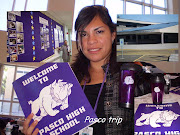
1. Social dominance
Dominant group: Native-English speakers in the U.S.,
Gina's first language: English
Target culture: Latina culture
Target Language: Spanish
2. Integration pattern
Most of students integrate themselves very well at tasks required by the target language teacher, but it almost always depends on the established rapport inside the classroom. Obviously, some students prefer doing things in isolation very apart of the mainstream, the main objective is so trying to integrate them the most we can to the language learning process through socialization with partners. In Gina's case, she will need to interact a lot with us in order to get a better understanding of our language and culture.
3. Enclosure
As Eastern Washington University has been doing conventions with a series of hispanic universities there is a great amount of spanish speakers on the campus with whom Gina may talk to and share with. In that way Gina will be able to practice her English and also she will know more about the culture of different hispanic peoples.
4. Size
Gina is alone trying to learn the language, she is trying to do it by herself. But there are lots of people on campus also learning Spanish, and whom she can go for help in case she needs it, too.
5. Cohesiveness
As I said in the previous answer, Gina is trying to learn the language on her own. There is no another group learning spanish with her. But Gina has a great advantage, she is immerse in a group of 15 Chileans students (future teachers of a language) what helps her a lot because she is able to listen to them most of the time, this helps her to develop more quickly a better listening comprehension, or at least her listening skills.
6. Cultural congruence
The home and target culture are kind of similar. Latina culture, in terms of customes and alimentary issues is very alike to the american culture. The principal difference Gina is going to find when studying and learning about the Latina culture will be that related to the status of latino countries. These countries are defined as "Developing countries" which makes them to be poorer countries in what refers to economy and tecnological developments. n the other hand, the USA are defined as a "Developed country". This may make a big struggle on the person who is learning the new culture, I mean a "Cultural Shock".
7. Attitude
The home and target groups have very good attitudes toward one another. The home group is very used to Latino speakers within their culture, and the target group wants Americans to know their culture and language in order to get more benefits and take more advantages from them. It is mainly a question of necessity. Both cultures need one another to survive.
8. Intended length of residence
Let's ask Gina first!!
Psychological Distance
1. Motivation
Gina has a "Full-time" motivation, she always wants to get new words in the target language and she is always asking her Spanish students to teach her a litlle bit of it. This is a great chance to learn because the more motivates she is, the more Spenish she gets.
2. Attitude
Gina feels very comfortable staying in the target language group. She always shows eagerness for learning and the group try to help her the most that it is possible. She has just to ask more and more and try to get immerse more in the target language.
3. Cultural Shock
She has not experienced yet a cultural shock, as she has not been or stayed in a Latino country, but when she do it she will do it very well because she is very motivated and also because she is trying very hardly to learn everyday.


























